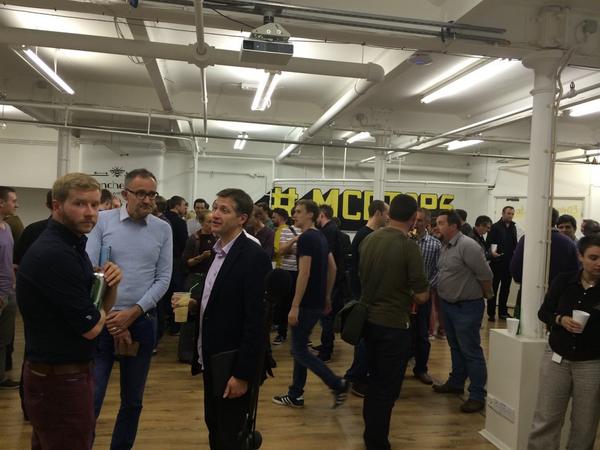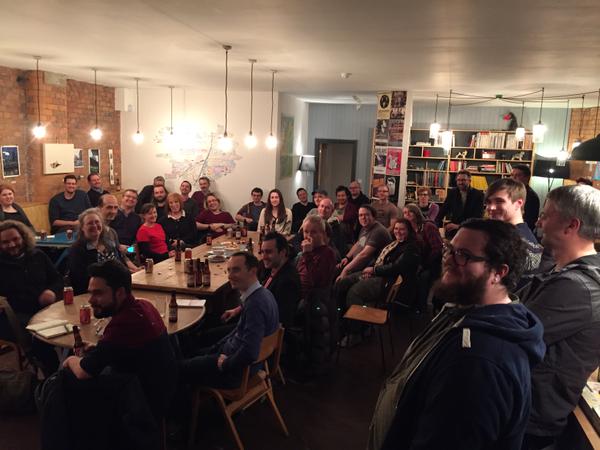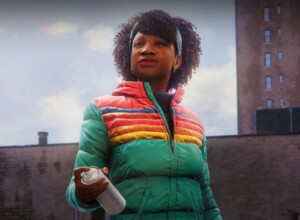It would be difficult to argue against the idea that the UK is witnessing a creative renaissance in its gaming sector.
Developers big and small can receive huge tax breaks, R&D funds and Creative England finance. Nottingham’s GameCity opened to seated audiences across the country, in as much as it threw open the doors for press and the people who attended the inaugural event in October. This year, the BBC announced it was officially going old-school with its Learning remit, announcing a Raspberry Pi-style giveaway for schoolkids. Finally, there’s TIGA’s most recent findings that the number of independent developers has tripled in less than 8 years. Suddenly, it becomes clear that the UK is becoming an ambitious and developer-friendly place once again.
Leeds, Dundee, Guildford, Brighton, London – clusters of studios and supportive social scenes abound in these cities and towns. But what about Manchester?
A recent ‘Future of Gaming Infrastructure’ roadshow by TIGA made its Manchester stop on tour at the tech start-up venue SpacePortX, and its attendance revealed just how many games developers there actually are who are based in the region – and how many more simply weren’t able to make it.
Meanwhile, the burgeoning “pink collar” tech scene expands alongside the hipster start-ups in the city’s Northern Quarter. Big app names like Flipboard and controversial growth hackers like Social Co continue to call the city home. They amount to enough reason for the last big regional paternal gesture from the Government: Manchester’s been earmarked a fund for a tech and science ‘Powerhouse’ vision…or maybe it’s just expensive electioneering. Either way, Manchester’s about to receive a hunky chunk of business grants – and its indie games scene is itching to go nuclear as it steps up to the plate.
However, it’s long been argued that the game scene is fragmented, with cliques and clubs and partners but nothing yet tangibly together, and in need of some gathering.
This is where GameopolisMCR comes in.
Simon Smith from Thumbfood, a local game developer currently working on Houdini, along with Keith Andrew, Games PR consultant and freelance journalist who edited Pocket Gamer for a number of years, are trying to make this happen. And soon.
“The curious thing about Manchester is, it was once the beating heart of the UK games development scene and, though the likes of Ocean and Acclaim who once called this city their home are now names from the past, the actual development talent that has always thrived in Manchester remains. It’s just not connected,” says Keith.
“That’s the whole drive behind Gameopolis – a play on Manchester’s Cottonopolis nickname when it was the first industrialised city in the world.”
Manchester’s history has long been one of co-operative hard work; its own city emblem being the honey bee which you can see dotted around all over the city.
“We want to help the developers, the publishers, the students, the service providers, the PR and the games journalists who operate within this city day in, day out to actually come together and make connections for the good of Manchester.”
It’s been whispered in some circles that a rather humungous blue chip company failed to complete on an office deal because the scene was so disparate, and this helped ‘Northern Powerhouse’ happen faster.
Rumours aside, the best example of regional reach and taking advantage of the North’s relatively compact, but organised networking convenience was the BBC, when MediaCityUK was announced back in 2007. The Corporation’s own re-location to Salford, the neighbouring city, happened with the support of large associations like Manchester Digital that at least had the social and professional groups required initially by a media giant looking to lay down new roots.
It would be a shame if that was the last example of how grouping together helped push Manchester’s tech vision forward. Indeed, the city’s own Council-sponsored mascot for Manchester Day in June is a little Nintendo-esque character called Pixel; a handheld device character not dissimilar to Adventure Time’s B-Mo.
The time is now for the development community to unite.
“Then things get even more exciting,” says Keith. “We want to sell Manchester to the rest of the world. We want the big publishers of the world, the fresh new talent and everyone in between to realise the advantages of being based in the city where games have always had a home.
“Hopefully, Gameopolis will strengthen Manchester’s game scene from within and then help extend its influence out beyond the city’s streets to the rest of the UK and beyond.”
Full disclosure: Jane McConnell is Head of PR at Manchester-based Pixelbomb Games, and has written this article from an insider’s perspective on the Manchester development scene.








